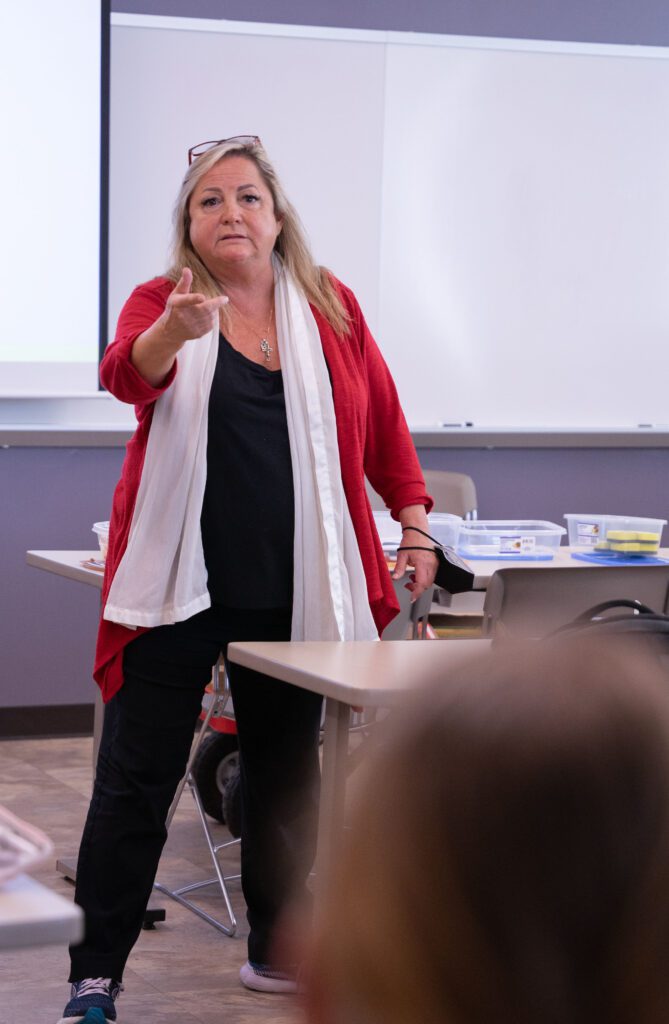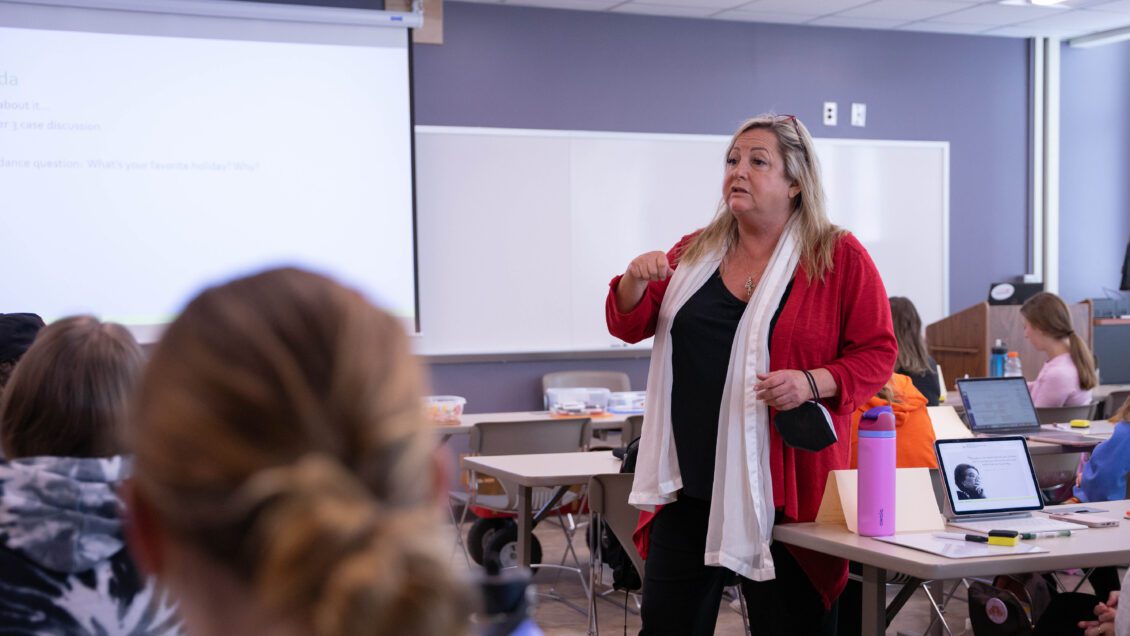The atmosphere in Sheliah Durham’s classroom is unusually chaotic at 9:30 a.m., but in the good way that indicates excitement instead of a loss of control. Every seat is filled, and Durham is bouncing from student to student, engaging in small talk and getting everyone prepped.
Then Durham points across the room, there is the unmistakable sound of a rain stick and the talking quickly fades out.
Durham serves as a lecturer in the Department of Teaching and Learning, and that rain stick–held and operated by a student in the room–is both classroom tool and example of what these students may one day use to divert attention in their own classrooms. It’s also a clear sign that it is time to engage and learn, and engagement is one of Durham’s primary goals as an educator.
We caught up with Durham to discuss her approach in the classroom, her inspirations and what shows she binges when she’s not prepping the next lecture.
What is your teaching philosophy?
A guiding principle in my philosophy of teaching is to consistently create–and facilitate the building of–bridges between the curriculum and authentic life experiences. Learning in a vacuum does not benefit the student or society. Under pressure to raise students’ test scores, educators often lose sight of the need to connect the literature of instruction to the students’ individual or group culture.
Ironically, the desire and drive to raise test scores has alienated segments of the population from the opportunity to find identity in the literature, namely minorities and those living in poverty. The result is loss of connection and engagement with the instructional text. If the curriculum or literature is not connected to the lived experience of the student, the student loses the opportunity for engagement and their opportunity for success is negatively affected.
Preparing individuals for the uncertainty and the challenges they will experience is vital for their success and their ability to participate as responsible world citizens. By facilitating and cultivating critical thinking and problem solving in the classroom, my desire is to assist students in the journey.

Why do you love teaching?
You get your jollies every day! Sure, some days are rough, but it is also exciting to see what works and figure out what doesn’t work. It is a dynamic process. I often tell people I learn more or just as much from my students than they do from the class. By interacting with students, I also grow and develop.
Another important aspect of my teaching is my experiences of teaching abroad. I worked at the American International School in Cairo, Egypt from 1998 – 2011. This changed me as an individual as well as my approach to instruction and teaching.
When did you know that the field of education was for you?
Very early in my life. As a child, I was curious and my parents encouraged that. I remember they invested in the World Book Encyclopedia when I was only six or seven. I spent hours pouring through those books. My parents also paid for a subscription to Dr. Suess books. It was such a thrill when they arrived. Most importantly, my parents would sit with me, go through the books with me and explain things to me. I was the kid that played school during summer vacations!

Name an educator that inspired you to teach.
Mrs. McDaniel was my third-grade teacher. Even though I enjoyed learning, I really struggled at school; especially in first and second grade. To make things worse, I was shy and socially awkward. I lacked confidence in my abilities and in myself. Typically, I was the one bullied up until grades eight and nine.
Mrs. McDaniel took an interest in me and encouraged me. She was the first teacher to say something positive about me in a parent conference. She called me “creative” and said I wrote the most engaging stories! I used reading and writing stories as an escape. Those words and her faith in me buoyed me throughout those years. She also inspired me to create a safe place in the classroom. I was so afraid of going to school; however, Mrs. McDaniel helped me feel safe and secure. I want our preservice teachers to realize they have the power that she did, and they can do amazing things to help their students. They may never realize it, but they make such a difference.
Describe an effective approach you use in the classroom.
I truly believe we learn as we interact and explore together. My basic structure is to introduce the lesson, do a mini-presentation–maybe 10 minutes–and then assign students into groups. In groups, they explore the information and discuss it. We then debrief as a class.
What is the most rewarding and most challenging aspect of teaching for you?
The most rewarding is watching students get excited about a concept or make an instructional strategy their own when they do their practicum or student teach. The most challenging is staying on top of current legislation that will impact our future educators and then facilitate new, innovative ideas that can help them navigate these difficult areas.
What tips do you have for students in the College of Education who are preparing to be educators?
Get to know your students as individuals first. Show them you care. Incorporate their interests into your instruction and resources. This will not only make classroom management easier, students will be more likely to engage with the material and be successful. We do not know what our students have to deal with outside the classroom, so creating a safe, caring environment can be a lifeline. Educators should never underestimate their power and the difference they make.
What do you like about the College of Education?
My colleagues! We have a great group of faculty and staff. They are supportive of each other and of our students. The people, including the administration, are so supportive. The college offers me so many opportunities to grow and develop. I am very thankful for those opportunities and experiences.
Is there any subject that you’re interested in or devote time to that might surprise people?
I’m a real nerd for British crime novels and TV shows. I binge Agatha Christie!
What do you enjoy doing when you are not teaching?
I love to travel, and I host teachers every summer in Egypt and sometimes Greece. I also enjoy watching those British crime shows on Britbox and Acorn TV!
Get in touch and we will connect you with the author or another expert.
Or email us at news@clemson.edu

